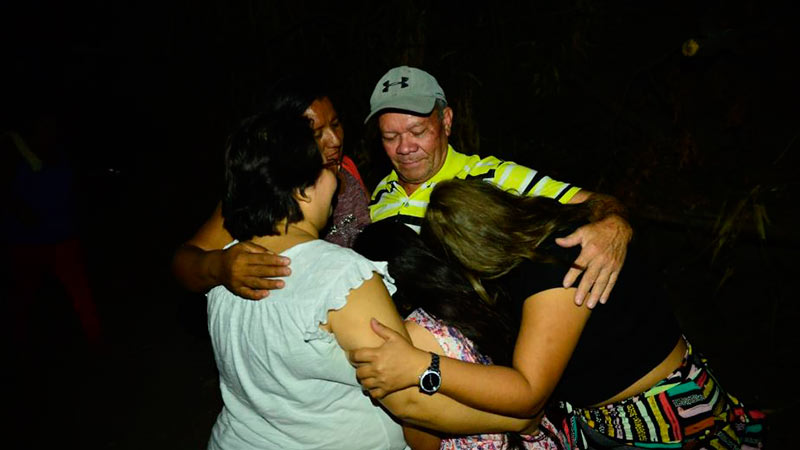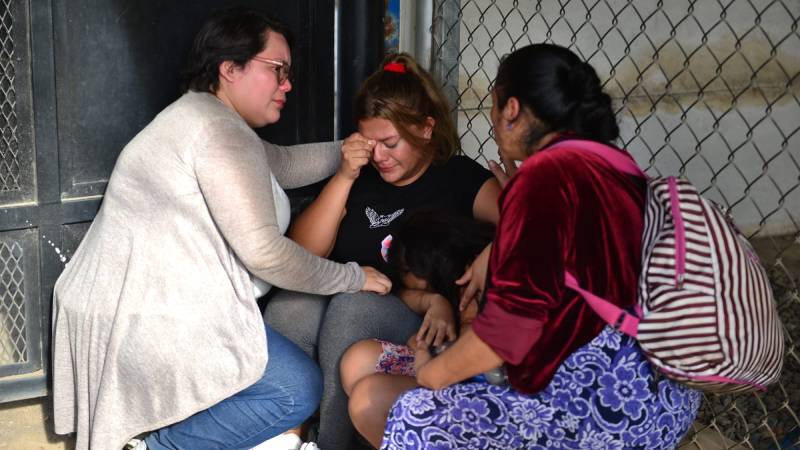Silence, tears and hugs, this was the release of journalist Carolina Amaya's father

Although the family was outside the Zacatecoluca prison farm, they were transported in a shaded pickup truck to the vicinity of their home.
With a mixture of tears, emotion, hugs and laughter, Benjamin Amaya's three daughters met their father, after 10 pm on Friday, in his modest home in the rural area of San Juan Ubico, after he was released after serving 10 years. Months in prison.
Very early that morning, journalist Carolina Amaya, Benjamin's daughter, sisters and the detainee's life partner, traveled to the Zacatecoluca penal farm with the hope and conviction that after several months she would embrace a loved one.
The Ubiku Investigation Court had ruled, a day earlier, to immediately release the accused after paying a bail of $10,000, and to issue alternative procedures to imprisonment.
The Carolinas were accompanied by representatives of the Association of Journalists of El Salvador (APES) and a group of journalists, but when they arrived at the front of the prison, the first thing they encountered was an attempt to obstruct press freedom by part of the prison. Guardians.
See: APES confirms release of journalist's father
However, when they met with people familiar with their rights, they ran out of arguments to prevent journalists from working and resorted to calling the police. Minutes later, a patrol of four police officers from the 911 system arrived in front of the prison, because prison farm guards reported “problems outside the place.”
“The attitude of the people in this prison farm was thuggish when they tried to prevent the press from doing their work in a public area because they wanted us to leave the place,” said Angelica Carcamo, president of APES.
On the penal farm
At 8:30, Carolina, accompanied by the lawyer from the APES Legal First Aid Clinic, Imperatriz Lopez, delivered her freedom speech at the information booth at the entrance to the prison farm and without further explanation they asked her to wait.
This wait continued for 11 hours without explaining to him what to do, if he had to wait or return. “I don’t know,” was the response of the guard, whose long nails did not appear until she opened the mesh window half way, when the journalist consulted her.
The unusual presence of journalists outside the place caught the attention of relatives of the detainees, who were standing in long lines to hand over bags containing basic necessities or to deposit money.
Cautiously, some asked if we worked for the government newspaper, others mentioned that they had traveled from far away to deposit money with their families for the Christmas kits they sold in prison shops, as this was the last day to deposit money. Even though their relatives have a release letter, the prisons refuse to release them.
After 11am, Karolina asked again if there was any progress on the document that had been delivered, because after more than three hours, they had not even returned the copy with the receipt stamp. The guards said briefly that they had no knowledge. Carolina said: “What we see is that the judicial system and the prison system are not coordinated, because there was an order yesterday to release my father and until now several hours have passed and the prison has not released him.”
Secret release
In the afternoon there were only a few people coming to deliver packages at the place, and some minivan-type vehicles with closed windows were leaving the prison, which, according to family members, is used as ambulances. A car also arrived for some inmates who were on their way to attend the hearings.
A shaded truck also left, in which Benjamin Amaya may have been taken from prison, but although his family was at the entrance, they were not informed.
In the afternoon, the area was deserted, only a few people coming every now and then to leave the bags that the guards had placed in the mountain of parcels and the mats that had been formed from what had been collected throughout the day.
When it was approximately three-thirty in the afternoon, which is the time when public administration employees stop working, the journalist approached the information booth again, but the guard closed the window to avoid answering her. Both Carolina and APES representatives insisted that at least the copy they received be returned. “The bosses are already on vacation” was heard on the other side of the window.
Benjamin's daughters cried from fear and torture for not giving them their father, or telling them anything, and in the meantime they took him to the Zacatecoluca police station to free him, but there the police did not receive him, so they took him and left him near. Artillery battalion.

A neighbor who was passing by was astonished when she saw the man wearing a prisoner's uniform, but then she recognized him and took him to her house.
When Benjamin arrived home, he found no one but Black, the dog, the parrot, and some cats, the family's pets, so he asked some neighbors for help to call them, but he did not get an answer either, because the girls and their life partners were unable to reach the phone signal outside the prison farm.
Meanwhile, Benjamin took a short tour of the land to see if the lemon tree he had planted before his capture had survived. He realized that the goats he had were no longer there, not knowing that the family had sold them so they could buy food while he was in prison.
Reunion
At six o'clock in the evening, between grief, sorrow, and physical exhaustion, the journalist and her relatives left the prison farm, without having an explanation or answer, other than the experience of mistreatment and silence suffered by dozens of their relatives. day at that place by so-called “public servants”.
Moments later, when they were able to reach a cell phone signal, they realized that Benjamin was already home. Hours later, they embraced each other, a moment they had longed for for more than 10 months.




:quality(85)/cloudfront-us-east-1.images.arcpublishing.com/infobae/P3M34YHXTVFZTCYTQQSSPRA4ZM)